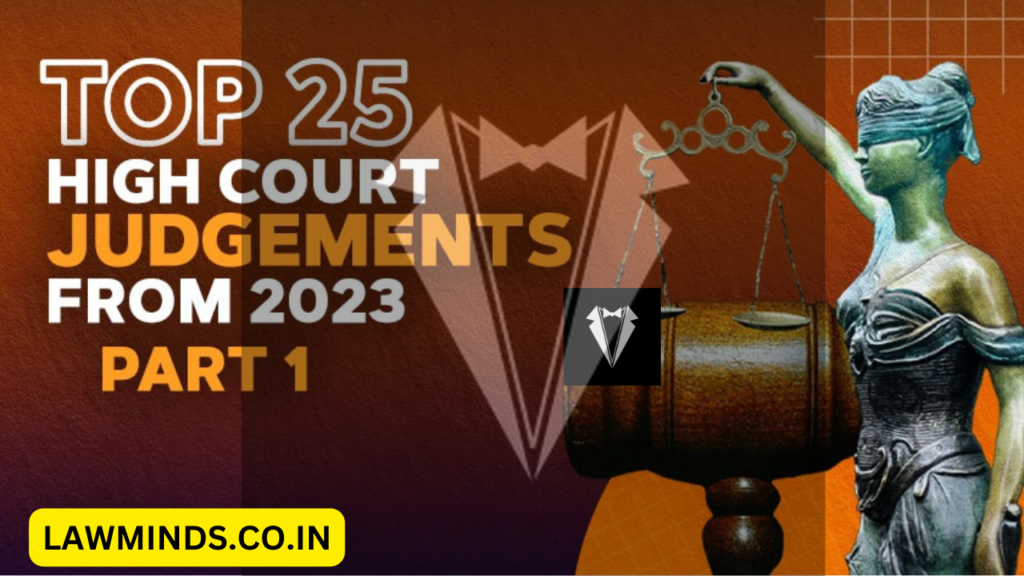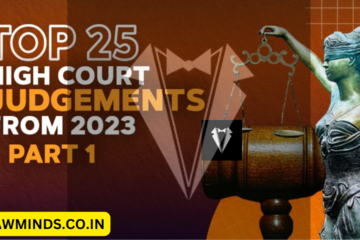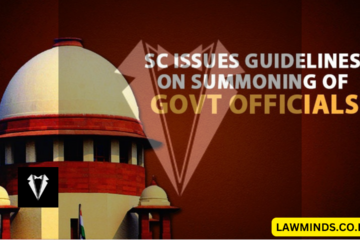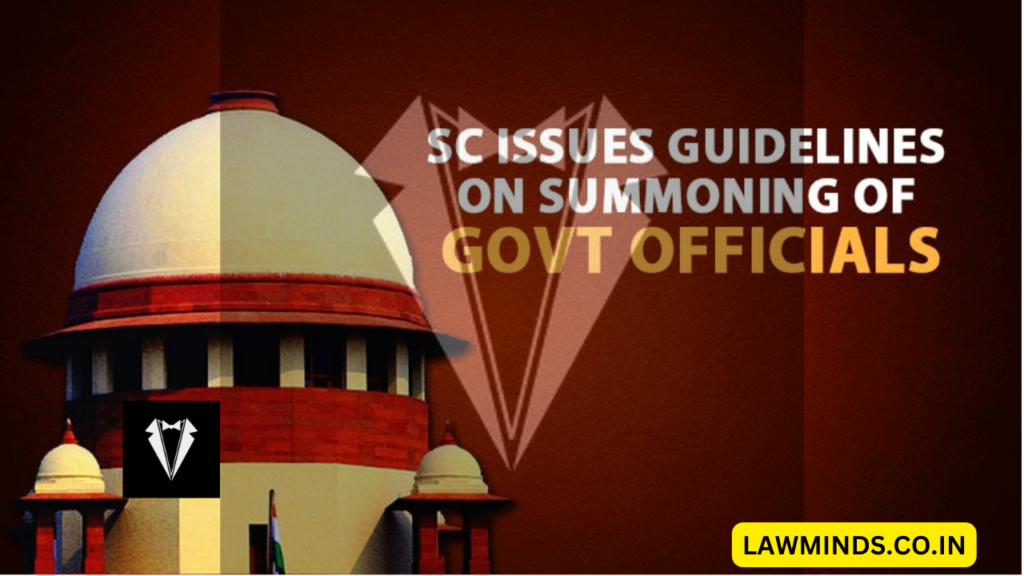In the wake of 2024, it becomes imperative for both legal practitioners and law students to acquire a comprehensive understanding of significant judgments handed down by the Supreme Court and various High Courts across the nation. At Lawstreet Journal, we have meticulously curated a list of over 50 noteworthy judgments and orders delivered by High Courts in the past year, considering their relevance and impact, whether positive or negative. To facilitate easy reading, we present the first part of this compilation:
- Allahabad High Court Directs Formation of High-Powered Committee for Corruption Cases: The Allahabad High Court instructed the Uttar Pradesh government to establish a high-powered committee, led by the Chief Secretary, to formulate comprehensive guidelines for the expeditious completion of investigations in corruption cases involving public servants.
- Systematic Design to Destroy Institution of Marriage – High Court on Live-In Relationship: Allowing a bail application in a rape case involving a live-in partner, the Allahabad High Court emphasized the security and stability offered by the institution of marriage, criticizing live-in relationships and highlighting their inadequacy in providing the same.
- Allahabad High Court Greenlights Scientific Survey of Gyanvapi Mosque Complex: The Allahabad High Court permitted the Archaeological Survey of India to conduct a survey of the Gyanvapi mosque complex in Varanasi to determine if the current structure was built on a pre-existing temple.
- Allahabad High Court Raps Censor Board Over ‘Adipurush’: The Allahabad High Court criticized the Central Board of Film Certification for approving the film ‘Adipurush,’ questioning its questionable dialogues and scenes related to the Hindu epic ‘Ramayana.’
- Allahabad High Court Transfers Krishna Janmabhoomi Cases: The Allahabad High Court ordered the transfer of all cases related to Krishna Janmabhoomi from the Mathura court to itself, exercising suo motu power for trial.
- Men Have Higher Responsibility to Prevent Gender Violence – Gujarat High Court: In a landmark verdict on marital rape, the Gujarat High Court asserted that men have a higher duty to avert gender violence than women, emphasizing the need to break the silence surrounding such issues.
- Gujarat High Court Castigates Jail Authorities for Not Releasing Convict Despite Bail: The Gujarat High Court criticized Sabarmati jail authorities for neglecting to release a life convict, granting bail three years ago, due to their failure to open an email attachment.
- Gujarat High Court Dismisses Rahul Gandhi’s Plea in Modi Surname Defamation Case: The Gujarat High Court rejected Rahul Gandhi’s plea to suspend his conviction in a defamation case, citing his conduct and multiple pending cases against him.
- Gujarat High Court References ‘Manusmriti’ to Discuss Early Marriage and Abortion: The Gujarat High Court cited ‘Manusmriti’ while discussing abortion, stating it is challenging to allow the abortion of a minor’s pregnancy at six or seven months.
- Fundamental Right to Hold Passport Can’t be Curtailed Without Due Procedure of Law – Andhra Pradesh High Court: The Andhra Pradesh High Court intervened to return the passport of a Non-Resident Indian, emphasizing the necessity of following due procedure under the Criminal Procedure Code.
- Vague Allegations Regarding Harassment Do Not Establish Offense Under Section 498A IPC – Andhra Pradesh High Court: The Andhra Pradesh High Court ruled that vague allegations in a dowry harassment case do not constitute an offense under Section 498A of the Indian Penal Code.
- Statement of Police Witnesses Cannot Be Discarded If They Inspire Confidence – Punjab & Haryana High Court: The Punjab & Haryana High Court clarified that the statements of police officials cannot be dismissed solely due to their profession; however, their testimonies must inspire confidence.
- Live-In Couple Entitled to Protection – Punjab & Haryana High Court: The Punjab & Haryana High Court affirmed that a couple in a live-in relationship is entitled to protection from threats, even if they may not be of marriageable age.
- Husband Has Moral and Legal Liability to Maintain Wife – Punjab & Haryana High Court: The Punjab & Haryana High Court stated that a husband has a moral and legal obligation to maintain his wife, even if he is a professional beggar.
- Wife Who Accepted Extramarital Affair of Husband Cannot Later Call it Cruelty – Delhi High Court: The Delhi High Court observed that if a spouse condones an extramarital affair, it cannot later be deemed an act of cruelty in divorce proceedings.
- Delhi High Court Disposes Pleas for SIT on Alleged Over-Invoicing by Adani’s, Essar’s & Others’ Power Cos: The Delhi High Court disposed of pleas seeking the formation of a Special Investigating Team against alleged over-invoicing by power companies, citing ongoing investigations.
- Delhi High Court Refuses to Entertain Plea on Women’s Reservation Act, 2023: The Delhi High Court declined to entertain a writ petition seeking the implementation of the Women’s Reservation Bill 2023 before the 2024 General Assembly elections.
- Surrogacy Industry Need Not Be Encouraged in India – Delhi High Court: The Delhi High Court expressed concerns about the growing ‘surrogacy industry,’ urging the State not to encourage it, especially when the petitioners are based outside India.
- Wife’s Insistence to Live Separately from Parents Amounts to Cruelty – Delhi High Court: The Delhi High Court held that a woman’s persistent insistence on living separately from her in-laws without justification constitutes cruelty, allowing divorce to the husband.
- No Rape If Muslim Man Makes Physical Relations With 15-Year-Old Wife – Delhi High Court: The Delhi High Court ruled that physical relations of a Muslim man with a 15-year-old wife after marriage cannot be termed as rape, upholding the acquittal of the accused.
- Unpaid Domestic Labour by Married Woman Considered for Legal Rights to Marital Property – Madras High Court: The Madras High Court ruled that unpaid domestic labor performed by a married woman must be considered when determining legal rights to marital property.
- Madras High Court Commutes Death Penalty, Orders Against ‘Two-Finger Test’: While commuting the death penalty, the Madras High Court reminded medical professionals about the prohibition of the ‘two-finger test’ on sexual assault survivors, holding them accountable for misconduct if performed.
- Madras High Court Urges State to Recognize ‘Deed of Familial Association’ for Same-Sex Couples: The Madras High Court encouraged the State government to establish a procedure for the registration of ‘Deed of Familial Association’ to validate same-sex relationships and enhance the status of individuals in such relationships.
- Madras High Court Directs Tamil Nadu Government to Ensure Quota for Transgenders: The Madras High Court directed the Tamil Nadu government to implement reservations for transgender persons in local body elections, emphasizing their inclusion in mainstream society and democratic participation.
The list continues with a diverse array of judgments covering various legal aspects and issues. Stay tuned for the second part




